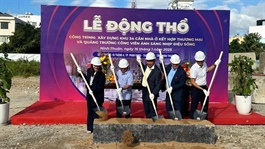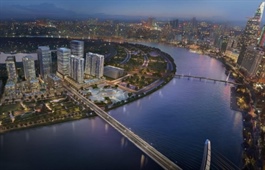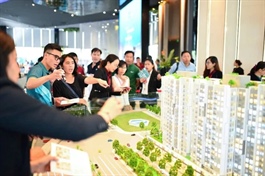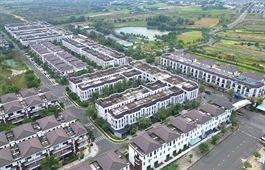Real estate FDI consolidates improvement
Real estate FDI consolidates improvement
A turning point could be ahead for Vietnam’s real estate market, driven by solid economic fundamentals, legislative changes, supportive urban planning policies, and infrastructure improvements.
Foreign direct investment (FDI) in the real estate sector for 2024 reached $3.72 billion in total, making up 18.8 per cent of the total for the year, second only to manufacturing, according to the General Statistics Office.

Large developers such as Hung Thinh, Novaland, Phat Dat, and TTC Land are negotiating with foreign enterprises and will soon announce deals. Photo: Le Toan |
A report from Avison Young Vietnam released in January points out that foreign investor confidence in the Vietnamese market is still positive, and capital is being poured into ventures that have been approved and licensed here.
David Jackson, general director of Avison Young Vietnam, said that strong FDI proved the attractiveness of Vietnam’s real estate market.
“Not only do they positively evaluate policy conditions, investment environment, population or urbanisation in Vietnam, investors also see a demand exceeding supply in most key segments such as industry, residential, office, retail and logistics. Efforts to improve the real estate legal framework and infrastructure development are contributing to making the market more attractive to international investors,” said Jackson.
He pointed out that the huge changes in 2024 in policies, investment trends and business were the basis for maintaining an optimistic vision of the real estate market. “When positive signals appear more clearly, it is time for investors to restart capital flow into transactions and be ready to catch the wave of cyclical development,” he added.
Vo Hong Thang, deputy general director of DKRA Group said that the year ahead was expected to be prosperous, with the market being on the recovery path from 2024.
“These positive signals are driven by factors in policy, supply, infrastructure and investment trends promise to create a new growth cycle,” said Thang. “One of the bright spots of the market was the removal of supply bottlenecks, especially projects that have been delayed for years. Supply in 2025 is expected to improve compared to 2024 with more than 15,000 products.”
Lee Leong Seng, head of property development at Keppel Vietnam, expects 2025 to see a significant increase in mergers and acquisitions, with new investment opportunities in the real estate sector.
“Amid global trend changes, Keppel is expanding its investment into diverse real estate sectors such as residential, hospitality, and emerging models like senior living and data centres. The company is also closely connected with global businesses to track and seize market trends, while observing that international funds are increasingly focusing on environmental, social, and governance criteria,” said Leong Seng.
“With its strong-growing economy and golden population, Vietnam is a promising destination for many international investment funds.”
He believes the combination of international investment capital and local market expertise will lead to success.
“Moving into 2025, with new policies, we expect macroeconomic changes to be translated into concrete action, contributing to the sustainable development of Vietnam’s real estate sector,” he added.
“We are particularly excited about the positive changes in the investment environment in Vietnam. These improvements boost confidence and open up many growth opportunities for both traditional and new industries.”
The expert opinions followed a flurry of activity towards the end of last year. With an estimated investment capital of approximately $797 million, CapitaLand is developing the Sycamore, its first large-scale residential undertaking in Vietnam with more than 460 low-rise villas and about 3,300 apartments, with a total construction area of about 593,000 sq.m.
CapitaLand also developed a luxury apartment venture called Lumi Hanoi, with a total investment of $760 million, providing about 4,000 units across nine towers.
Meanwhile, Consmos Initia from Japan poured $150 million in a cooperation with TT Capital Investment JSC to develop a 2,000 high-end apartment projects, called TT Avio located in Di An city of Binh Duong province.
Japanese developers Sumitomo Forestry, Kumagai Gumi, NTT, and AEON Vietnam have joined with Kim Oanh Group to invest in a 50-hectare scheme in Binh Duong called The One World, costing more than $1 billion.
AEON Mall also continued its expansion plan with the opening of AEON Mall Hue in September. The retailer also acquired a 10.5 hectare land area in Thanh Hoa province to become the largest commercial centre in the central region. In addition, it approved the detailed master plan for an AEON Mall in Dong Nai province.
Pham Hoang Ha, a property consultant in Ho Chi Minh City, said that 2025 would see foreign investors pouring capital into southern real estate.
“Large developers such as Hung Thinh, Novaland, Phat Dat, and TTC Land are negotiating with foreign enterprises and will soon announce deals,” Ha said.
Shifting investment out of the central areas where inner-city land has become increasingly scarce and development costs increased, and finding opportunities in surrounding areas is now a strategic choice for investors. In addition to the improvement in supply, market liquidity has also seen positive changes in 2025, with home loan interest rates remaining low and investor confidence gradually improving.
“Projects implemented by reputable investors with guaranteed construction progress, clear legal regulations and infrastructure facilities are the top priority of investors,” Ha added.
Keisuke Muraoka, representative of Cosmos Initia, a member of Japan’s Daiwa House, said foreign investors in Vietnam must be careful with factors such as, legality, demand, location, and facilities.
“In addition to ensuring legal progress, we pay special attention to the potential to draw in end-users of projects, who buy products for living. For partners, we look for those with extensive experience in housing development and a strong reputation in the market,” said Muraoka.
Ada Choi - Head of Research, CBRE Asia-Pacific

Ada Choi, Head of Research, CBRE Asia-Pacific |
I would like to highlight the increasing investment appetite in Asia-Pacific, with Vietnam a top destination due to its economic confidence and strategic role in manufacturing and supply chain diversification.
Singapore remains the largest investor in Vietnam, with a significant portion of investments coming from manufacturing. Meanwhile, the Japanese are diversifying their operations and Hong Kong is a channel for Chinese capital.
For 2025, international investors are expected to focus on development projects rather than income-generating properties, particularly in the residential and industrial sectors, as opportunities in these areas are more prominent in Vietnam compared to other regions. Other potential segments would be retail, residential and hospitality. International investors may need to differentiate their strategies in Vietnam, possible through partnerships with locals, if they cannot invest directly into income-generating properties.
International investors also need to figure out how to gain exposure to the Vietnamese market, considering the different investment strategies required compared to other regions.
Nguyen Le Dung - Head of Investment Services, Savills Hanoi

Nguyen Le Dung - Head of Investment Services, Savills Hanoi |
Investors from Singapore, Japan, and South Korea are all active. Besides that, the US and Europe are also increasingly interested in the Vietnamese market. Among them, the segments that receive the most attention from investors include residential real estate, industrial, and commercial property.
The residential real estate segment continues to draw in a lot of attention due to urbanisation and rising housing demand in major cities in Vietnam, while the supply of new projects is recorded at a low level due to legal restrictions.
The strong development of the manufacturing industry in Vietnam has made industrial real estate an attractive segment, driven by the presence of many foreign investment funds and investors, focusing on Grade A warehouse and workshop projects that meet high standards and quality in the market.
The commercial real estate segment also received great attention, thanks to the development of the retail and service markets. This reflects the increase in demand growth in parallel with urban real estate types and is supported by factors such as the transformation of people’s consumption habits, with more customers prioritising experience shopping at commercial centres and closed multi-functional service spaces.
Investors today tend to prioritise cooperation with private enterprises, thanks to their flexibility and ability to quickly adapt to operations. The scale and total investment of investors is diverse and will change depending on each development segment. However, investors pay special attention to projects that can develop sustainably and meet current market needs to increase product quality and consumer experience.
In addition, legal issues will be given priority due to their direct impact on implementation progress, transaction structure, and investors’ financial plans.

























